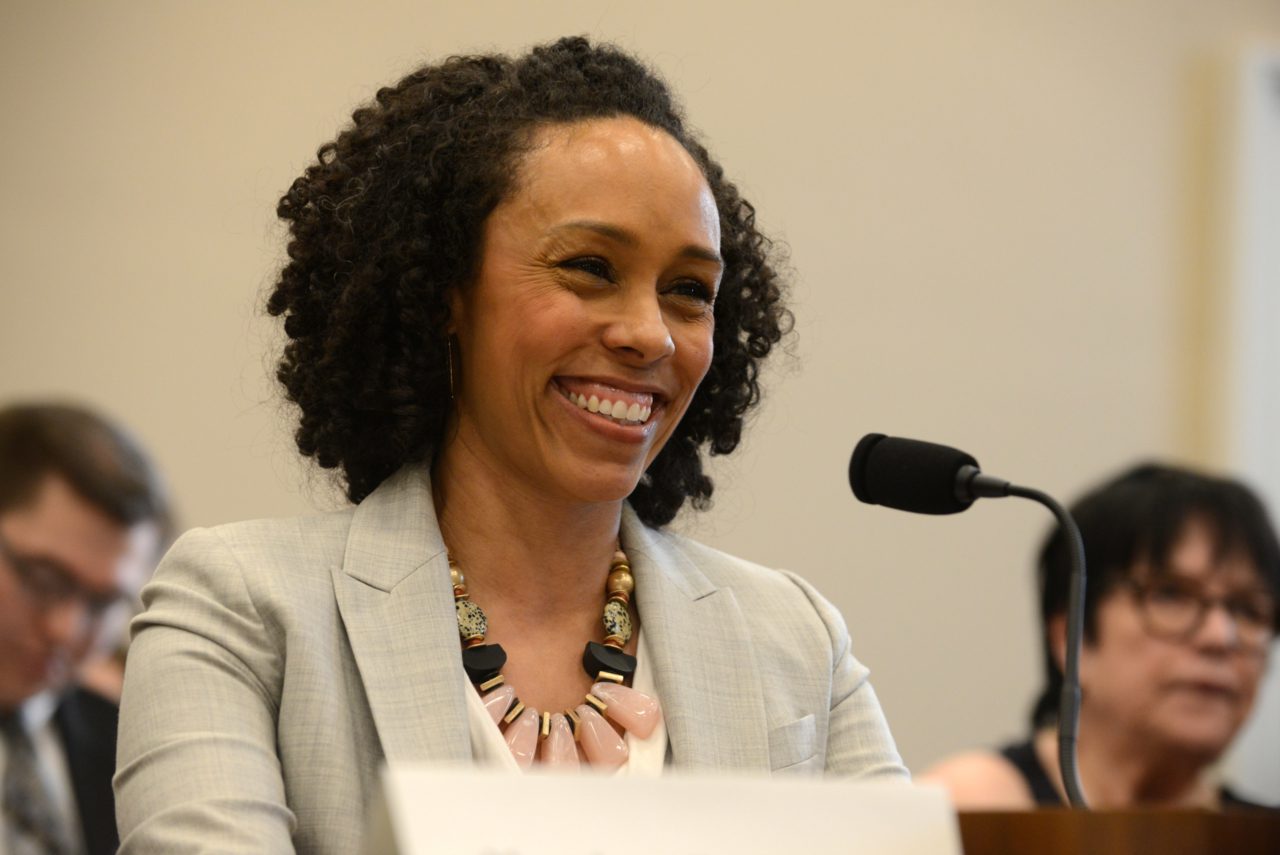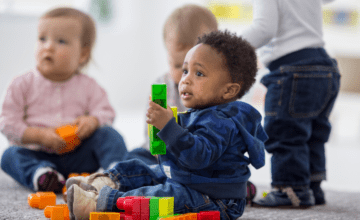Chief Policy Officer Myra Jones-Taylor’s statement to the Subcommittee on Labor, Health & Human Services, Education & Related Agencies on April 9, 2019:
WASHINGTON — Chairwoman DeLauro, Ranking Member Cole and Members of the Subcommittee, thank you for inviting me to testify before you about critical investments to ensure our nation’s babies and their families thrive. I am Myra Jones Taylor, Chief Policy Officer at ZERO TO THREE, a national nonprofit that for more than 40 years has translated the science of early childhood development for parents, practitioners, and policymakers to ensure that all babies and toddlers have a strong start in life. I have three funding requests today, great and small, each of which would help support the development of our future workers, innovators, and leaders. All are in the Department of Health and Human Services. I request an increase of $5 billion for the Child Care and Development Block Grant, to help parents work and children learn; a $500 million increase in the set-aside for expanding Early Head Start, providing comprehensive services for babies and families in poverty; and an increase of $15 million for the Infant and Early Childhood Mental Health Promotion, Intervention, and Treatment Grants, which build capacity to address the unique mental health needs of very young children. I also underscore the urgent need to lift the cap on domestic spending to accommodate these and other needs in children’s programs. If we cannot make room for investments in our children, we are essentially capping our future.
As a leading early childhood organization, we appreciate the long-standing support of the Chair and Ranking Member of this Subcommittee—no matter in which chair you sit—for early care and learning programs. I also want to thank you for supporting the Infant-Toddler Court Program, which transforms child welfare practice to support babies and families together. I will highlight just one of many positive outcomes: of all closed cases since 2014, less than 1 percent of children experienced a recurrence of maltreatment, compared with the national standard of 9.1 percent. That is truly changing lives, and you have helped this happen.
Changing the odds is important, because babies are born with unlimited potential. The first three years are a time in human development unmatched by any other point later in life. 12 million infants and toddlers live in the United States. The foundation we lay for them today is the most important investment we can make for our society tomorrow. We cannot afford to waste the potential of a single child. Yet, our recently released State of Babies Yearbook: 2019 reveals troubling early warning signs that too many children face conditions that place their development at risk. Almost a quarter (23 percent) live in poverty. Almost half live in families with incomes less than twice the federal poverty level. 17 percent live in households with low or very low food security. 16 percent live in crowded housing conditions.
Today’s families are stressed from juggling the dual roles of working to make ends meet and parenting our future workers. Families with few economic and social resources are particularly challenged to buffer their children from the chronic, unrelenting stress that can be toxic to the developing brain. We can help families give their babies the start in life that will ensure a strong future for our nation. I urge you to make their potential your priority as you make funding decisions for programs that help them thrive.
Double the Child Care and Development Block Grant with a $5 billion increase: Child care is catching fire as a national issue, fueled by parents frustrated by the search for affordable, quality care. For working families, child care is the essential element to make work possible. For the 6 million babies and toddlers who spend part of their day in non-parental care, child care plays a major role in shaping their young brains. For children facing the greatest odds, high quality care from birth to age five benefits their development and produces a substantial return on investment—13 percent per annum. While infant-toddler child care in 28 states exceeds the cost of public college, the vast majority of babies live in low to moderate income families.
The Child Care and Development Block Grant, which helps low-income families purchase care, can play a pivotal role in our nation’s child care quandary. After years of stagnant funding, we appreciate your leadership in providing a historic boost by nearly doubling CCDBG’s funding in 2018. This investment made a real difference, to the great benefit of many babies as states often increased reimbursements for infant-toddler care. Professional development opportunities opened up. States were able to implement reforms of the 2014 reauthorization.
We need to build on this progress to close gaps and ensure more children and families have access to affordable quality care. Only one in six federally-eligible children receive assistance. Reimbursement rates in almost all states still are well below market rates, placing quality programs out of reach for families. We ask you to continue your strong leadership f and double CCDBG funds again, adding $5 billion to build strong young brains and a stronger future. It is a bold ask, but child care is a critical need—and America’s babies are counting on you.
Add $500 million for Early Head Start expansion: Early Head Start, which will turn 25 next month, is the only federal program focused on ensuring the strong development of infants, toddlers, and pregnant women who live in poverty. These are the children at greatest risk of falling behind, starting at birth and even before. Many may have no other opportunity to attend an organized program, much less one that meets their families’ needs comprehensively. Early Head Start’s research shows that the program has positive impacts on children’s cognitive and social-emotional development, areas important to success in school. It improves parents’ interactions with their children and ability to support positive early development and prepares them to move toward self-sufficiency.
Yet, this successful program reaches only 7 percent of income-eligible children. Again, this Subcommittee has led in providing the means for Early Head Start to grow through a set-aside for expansion that may include child care partnerships, but still encourages expansion that fulfills Early Head Start’s mission to reach pregnant women and very young children in deepest poverty. When we say we can’t afford to lose the potential of a single child, these are the babies who are at gravest risk. We ask that you continue to grow this funding mechanism—the only way to increase Early Head Start directly—by adding $500 million, which would enable the program to reach thousands more children. What a 25th birthday present this would be!
Increase funding for Infant and Early Childhood Mental Health Grants: The foundations for early learning are laid through babies’ earliest relationships formed with their close caregivers. The first days, months, and years of life are when the adults who care for them can truly promote strong, positive mental wellness. Babies are deeply feeling beings who experience peaks of joy and elation as well as depths of grief, sadness, hopelessness, intense anger, and rage. Learning to self-regulate these strong emotions, form relationships, cooperate with peers are the skills that will carry them to school success.
Sometimes this social-emotional development can go awry. It is estimated that between 9.5 percent and 14.2 percent of children age birth to 5 experience an emotional or behavioral disturbance. These young children, who have not yet entered the K-12 school system, are particularly invisible to our mental health system, which is not designed to meet their needs. Work is ongoing to meet the unique set of needs of this population, but it needs support to spread systemically.
With the Infant and Early Childhood Mental Health Promotion, Intervention, and Treatment grants, now funded within the Mental Health Programs of Regional and National Significance, Congress recognized the importance of the mental health of young children and their families. By investing in early mental health prevention, identification, and treatment, we can reduce the need for treatment later in life, when it becomes much more difficult, time intensive, and expensive. We greatly appreciated Congress providing $5 million in funding for this new program. These grants help states that are hard at work developing systems to identify, refer, assess, and treat children in this age range using partnerships with primary care, child care, and other child-serving systems and services. However, grants could be awarded only to 10 entities in eight states. Funding more states would leverage expanded services for many more young children. Therefore, we ask the Subcommittee to increase funding by $15 million to a total of $20 million and consider a grant level of at least $1 million.
In closing, I thank the Subcommittee for this opportunity to appear before you. As you make decisions about the level of domestic spending and specific funding levels, I urge you to think about the 4 million babies who will be born this year and ensure that we do not squander the potential of a single one.
About ZERO TO THREE
ZERO TO THREE works to ensure all babies and toddlers benefit from the family and community connections critical to their well-being and development. Since 1977, the organization has advanced the proven power of nurturing relationships by transforming the science of early childhood into helpful resources, practical tools and responsive policies for millions of parents, professionals and policymakers. For more information, and to learn how to become a ZERO TO THREE member, please visit zerotothree.org, facebook.com/ZEROTOTHREE or follow @ZEROTOTHREE on Twitter.


